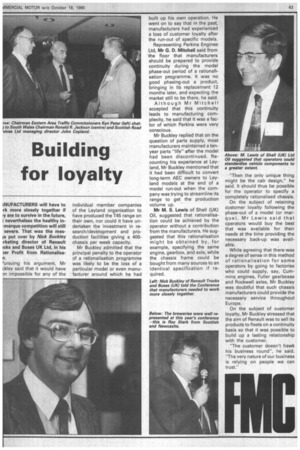Building for loyalty
Page 45

If you've noticed an error in this article please click here to report it so we can fix it.
lNUFACTURERS will have to
■ rk more closely together if If are to survive in the future, t nevertheless the healthy in-marque competition will still severe. That was the mesle put over by Nick Buckley trketing director of Renault icks and Buses UK Ltd, in his 3er Profit from Rationalisan.
'ursuing his argument, Mr ckley said that it would have ?.n impossible for any of the individual member companies of the Leyland organisation to have produced the T45 range on their own, nor could it have undertaken the investment in research/development and production facilities giving a 400chassis per week capacity.
Mr Buckley admitted that the principal penalty to the operator of a rationalisation programme was likely to be the loss of a particular model or even manufacturer around which he had built up his own operation. He went on to say that in the past, manufacturers had experienced a loss of customer loyalty after the run-out of specific models.
Representing Perkins Engines Ltd, Mr G. D. Mitchell said from the floor that manufacturers should be prepared to provide continuity during the model phase-out period of a rationalisation programme. It was no good phasing-out a product, bringing in its replacement 12 months later, and expecting the market still to be there, he said Although Mr Mitchell accepted that this continuity leads to manufacturing complexity, he said that it was a factor of which Perkins were very conscious.
Mr Buckley replied that on the question of parts supply, most manufacturers maintained a ten year parts "life" .after the model had been discontinued. Re counting his experience at Ley land, Mr Buckley mentioned that it had been difficult to convert long-term AEC owners to Ley land models at the end of a model run-out when the com pany was trying to streamline its range to get the production volume up.
Mr M. S. Lewis of Shell (UK) Oil, suggested that rationalisa tion could be achieved by the operator without a contribution from the manufacturers. He sug gested that this rationalisation might be obtained by, for example, specifying the same engine, gearbox, and axle, while the chassis frame could be bought from many sources to an identical specification if required.
Left: Nick Buckley of Renault Trucks and Buses (UK) told the Conference that manufacturers needed to work more closely together. "Then the only unique thing might be the cab design," he said. It should thus be possible for the operator to specify a completely rationalised chassis.
On the subject of retaining customer loyalty following the phase-out of a model (or marque), Mr Lewis said that operators would buy the best that was available for their needs at the time providing the necessary back-up was avail able.
While agreeing that there was a degree of sense in this method of rationalisation for some operators by going to factories who could supply, say. Cummins engines, Fuller gearboxes and Rockwell axles, Mr Buckley was doubtful that such chassis manufacturers could provide the necessary service throughout Europe.
On the subject of customer loyalty, Mr Buckley stressed that the aim of Renault was to sell its products to fleets on a continuity basis so that it was possible to build up a lasting relationship with the customer.
"The customer doesn't hawk his business round", he said. "The very nature of our business is relying on people we can trust."




























































































































































































































































































